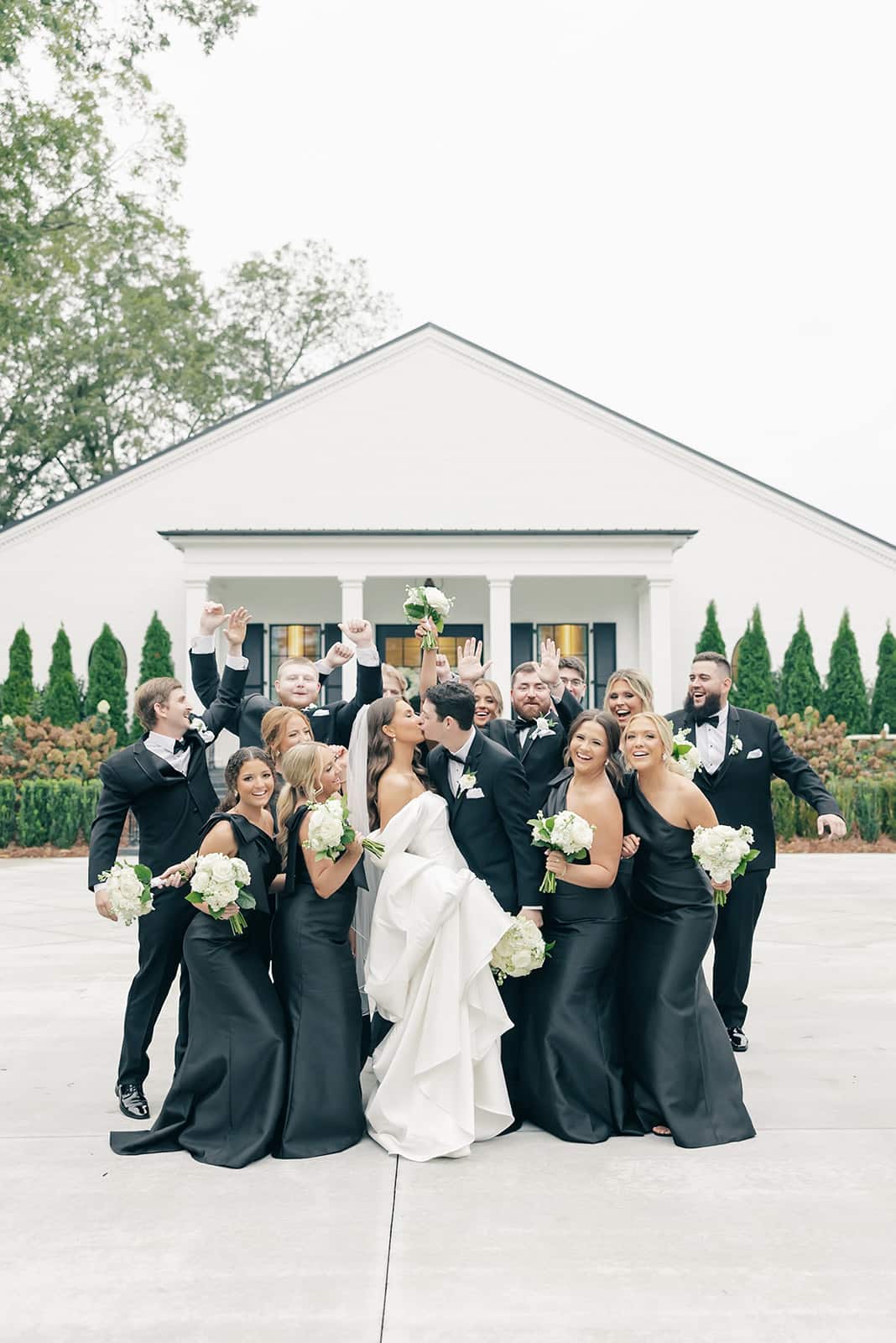Planning a wedding involves countless decisions, tight timelines, and significant financial investment, creating numerous opportunities for costly mistakes. Learning from couples who’ve navigated these challenges before you can save thousands of dollars, prevent major stress, and ensure your celebration unfolds exactly as envisioned. This comprehensive guide identifies the most common wedding planning pitfalls and provides proven strategies to avoid them entirely.

Why Learning from Others’ Mistakes Matters
The Cost of Wedding Planning Errors
Professional wedding planners report that 80% of wedding day issues stem from preventable planning mistakes made months earlier. Understanding these common pitfalls allows you to implement protective strategies that ensure smooth planning and flawless execution.
Prevention vs. Crisis Management

Mistake #1: Starting Without a Clear Budget
The Problem
Without clear budget parameters, couples often fall in love with expensive options they cannot afford, creating emotional attachment to elements beyond their means. This pattern frequently results in budget overruns, family financial stress, or disappointing compromises on important celebration elements.
The Solution
Budget protection strategies:
- Set hard limits: Determine maximum spending for each category before shopping
- Include contingency funds: Reserve 10% for unexpected expenses or last-minute additions
- Track expenses consistently: Monitor spending against budget throughout planning
- Communicate limits clearly: Share budget constraints with all vendors during initial consultations
- Avoid emotional overspending: Make financial decisions based on predetermined limits, not in-the-moment excitement
Mistake #2: Booking Vendors Without Proper Research
The Problem
Insufficient vendor research manifests in various ways: photographers whose style doesn’t match expectations, caterers with poor service reputations, or entertainers who fail to deliver promised experiences. These problems become apparent too late for easy solutions.
The Solution
Comprehensive vendor research includes:
- Portfolio review: Examine extensive work samples, not just highlight reels
- Reference conversations: Speak with recent clients about actual experiences
- Contract analysis: Review all terms, cancellation policies, and additional fees
- Insurance verification: Confirm proper liability and business insurance coverage
- Payment protection: Understand deposit requirements and payment schedules
- Communication assessment: Evaluate responsiveness and professionalism during initial interactions
Never book vendors based solely on price or single recommendations. Quality vendors welcome thorough evaluation and provide comprehensive information willingly.

Mistake #3: Ignoring Weather Contingency Plans
The Problem
Weather-related problems extend beyond rain—extreme heat, unexpected cold, high winds, and severe storms can all impact outdoor celebrations. Without proper contingencies, couples face impossible last-minute decisions that compromise their vision and guest comfort.
The Solution
Weather contingency planning involves:
- Covered space identification: Secure indoor or covered alternatives for all outdoor elements
- Equipment preparation: Arrange for tents, heaters, or fans based on potential conditions
- Timeline flexibility: Build weather decision points into your wedding day schedule
- Guest communication: Develop systems for informing guests about location changes
- Vendor coordination: Ensure all vendors understand backup plans and equipment needs
- Decoration adaptation: Plan décor that works in both primary and backup locations
Weather backup plans should feel like intentional design choices, not disappointing compromises. Work with vendors to create beautiful alternatives that maintain your celebration’s atmosphere regardless of conditions.
Mistake #4: Underestimating Timeline Requirements
The Problem
Unrealistic timelines often stem from inexperience with wedding day logistics and failure to account for natural delays, emotional moments, and coordination requirements. When events run behind schedule, subsequent activities suffer, and vendors struggle to deliver promised services.
The Solution
Effective timeline development includes:
- Professional consultation: Work with experienced vendors to understand realistic timing
- Buffer time inclusion: Add 15-30 minutes between major activities for transitions
- Vendor coordination: Ensure all service providers understand and agree to timeline requirements
- Contingency planning: Identify which activities can be shortened if delays occur
- Communication systems: Establish clear communication methods for day-of coordination
- Priority identification: Determine which moments are most important if time becomes limited
Share detailed timelines with all vendors, wedding party members, and family participants well before the wedding day. Everyone involved should understand their responsibilities and timing requirements.
Mistake #5: Poor Guest Communication
The Problem
Poor communication often results in guest questions flooding the couple during final planning weeks, RSVP confusion that affects catering counts, and guest arrival issues that disrupt ceremony timing. These problems add unnecessary stress during an already busy period.
The Solution
Effective guest communication strategies:
- Wedding website creation: Centralize information about schedule, directions, accommodations, and frequently asked questions
- Clear invitation details: Include specific timing, location information, and any special instructions
- Accommodation assistance: Provide hotel recommendations and block information for out-of-town guests
- Transportation guidance: Share parking information, shuttle details, or ride-share suggestions
- Dress code clarification: Specify attire expectations clearly to prevent inappropriate clothing choices
- Special requirements notification: Inform guests about outdoor locations, accessibility features, or other relevant details
Update guest information promptly when changes occur, and establish points of contact for questions to prevent overwhelming the couple with individual inquiries.

Mistake #6: Overlooking Vendor Meal Requirements
The Problem
Failing to provide vendor meals can strain relationships with photographers, musicians, and other professionals whose services continue throughout your reception. Hungry vendors may leave the premises to find food, affecting coverage during important moments.
The Solution
Vendor meal planning considerations:
- Meal timing: Schedule vendor meals during natural celebration breaks
- Dietary accommodations: Ask vendors about dietary restrictions or preferences
- Space allocation: Designate appropriate areas for vendor meal breaks
- Service coordination: Ensure vendor meals don’t interfere with guest service
- Budget inclusion: Account for vendor meals in overall catering costs
- Appreciation gestures: Consider vendor meals as professional courtesy and relationship investment
Professional vendors appreciate couples who consider their needs, often resulting in enhanced service and stronger working relationships.
Mistake #7: Last-Minute Guest List Changes
The Problem
Guest list changes often occur due to family pressure, relationship developments, or initial planning oversights. However, these modifications during final weeks create vendor coordination challenges and additional expenses that could have been avoided with earlier decision-making.
The Solution
Guest list management strategies:
- Early finalization: Complete guest lists at least 8-10 weeks before the wedding
- Family communication: Set clear expectations about guest list decision authority
- Vendor deadline awareness: Understand each vendor’s requirements for final counts
- Buffer planning: Include small guest count buffers in initial vendor contracts
- Change cost understanding: Know the financial implications of modifications
- Boundary maintenance: Resist pressure for last-minute additions that compromise planning
Most vendors require final guest counts 1-2 weeks before weddings, making earlier guest list finalization essential for smooth coordination.
Mistake #8: Neglecting Marriage License Requirements
The Problem
Marriage license oversights can prevent legal marriage completion, require emergency courthouse visits during wedding week, or create administrative problems that add stress during final celebration preparations.
The Solution
Marriage license planning includes:
- Requirement research: Understand your state’s specific documentation and timing requirements
- Scheduling coordination: Obtain licenses within required timeframes but not too early for expiration
- Documentation preparation: Gather necessary identification, previous marriage documentation, or other required papers
- Witness arrangements: Ensure proper witness availability and identification requirements
- Officiant coordination: Confirm your officiant’s authority to perform marriages in your state
- Name change planning: Consider how marriage name changes affect travel documents and other identification
Complete marriage license requirements during a calm planning period rather than during stressful final weeks.
Mistake #9: Inadequate Day-of Emergency Preparations
The Problem
Wedding day emergencies frequently involve wardrobe malfunctions, beauty touch-ups, vendor issues, or guest problems that require immediate solutions. Without preparation, these situations create unnecessary stress and distraction from celebration enjoyment.
The Solution
Wedding day emergency preparation includes:
- Emergency kit assembly: Include stain removers, sewing supplies, beauty touch-up products, medications, and comfort items
- Responsibility delegation: Assign specific people to handle different types of emergencies
- Vendor contact information: Compile complete contact lists for all service providers
- Backup plan activation: Designate decision-makers for implementing contingency plans
- Communication systems: Establish clear methods for reporting and resolving issues
- Priority identification: Determine which problems require immediate couple involvement versus independent resolution
Emergency preparation allows couples to focus on celebration enjoyment while trusted individuals manage inevitable minor issues.

Mistake #10: Forgetting to Enjoy the Process
The Problem
When couples become consumed by planning details, they often neglect their relationship, personal well-being, and the joy that should accompany engagement and wedding preparation. This pattern can affect not only planning enjoyment but also the wedding day experience itself.
The Solution
Enjoyment preservation strategies:
- Regular date nights: Schedule planning-free time for relationship enjoyment
- Milestone celebrations: Acknowledge major planning achievements and progress
- Perspective maintenance: Remember that minor details won’t affect long-term happiness
- Support system utilization: Accept help from family and friends who offer assistance
- Stress management: Practice relaxation techniques and maintain healthy lifestyle habits
- Focus prioritization: Concentrate energy on elements that truly matter to your relationship
The most beautiful weddings reflect couples’ genuine happiness and excitement about their future together, not perfect execution of every planning detail.
Creating Your Mistake-Prevention Strategy
Proactive Planning Approach
Develop personal accountability systems that help you stay organized, meet deadlines, and maintain perspective throughout the planning process. Use checklists, timeline trackers, and regular planning reviews to ensure nothing falls through the cracks.
Professional Support Considerations
Even partial planning services or day-of coordination can significantly reduce mistake risks and improve celebration execution, often providing value that exceeds their cost through problem prevention and vendor relationship management.
Learning and Adapting
Monitor planning progress regularly, reassess decisions as new information becomes available, and don’t hesitate to make changes that improve your celebration or reduce stress. The best wedding plans evolve thoughtfully throughout the engagement period.
Wedding planning mistakes are preventable through education, preparation, and realistic expectation setting. By understanding common pitfalls and implementing protective strategies, you can navigate planning confidently while creating the beautiful celebration you’ve always envisioned.
Focus on decisions and elements that truly matter to your relationship and future together. When planning feels overwhelming, remember that your wedding day represents the beginning of your marriage, not the culmination of perfect event execution. The most memorable celebrations reflect genuine love, joy, and excitement about the future, regardless of minor imperfections that guests rarely notice or remember.








